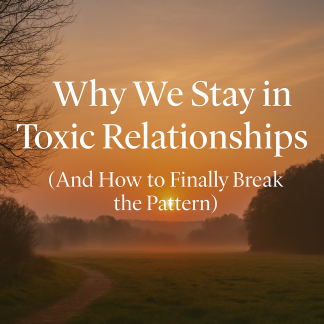Why We Stay in Toxic Relationships (And How to Finally Break the Pattern)
Have you ever thought:
“Why do I keep ending up with the same kind of partner?”
“Why do I feel uncomfortable when someone is actually kind to me?”
“Why do I keep shrinking in relationships, even when I swore I wouldn’t?”
If that’s you — you’re not alone. And more importantly, you’re not broken. We are never broken but often breaking up with some new opportunities and perceptions.
These patterns often have less to do with your conscious choices… and more to do with what your nervous system learned to normalize long ago.
Let’s break it down.
Trauma Doesn’t Live in the Past. It Lives in the Body.
We tend to think of trauma as something dramatic — an accident, a violent event, a clear “before and after.” But in reality, trauma is what happens inside your body when something overwhelms your capacity to cope.
Even more surprising?
Trauma doesn’t live in the event. It lives in your physiology.
It shapes how you relate, how you protect yourself, and what feels “normal.”
So when you grew up in an environment where love came with strings… where emotional repression was the rule… or where chaos, silence, or criticism were daily experiences — that became your body’s map of relationship.
Why Safe Love Feels “Wrong”
Let’s say you finally meet someone who’s calm, consistent, respectful.
You should feel safe.
But instead, your gut tightens. You want to run. Or you think:
“Something’s off. They’re too nice. This feels weird.”
That’s not you being dramatic. That’s your nervous system saying:
“This isn’t what love has felt like before. I don’t trust it.”
So what happens?
You pull away. You self-sabotage. Or you go back to the familiar — the hot-and-cold love, the edge-of-walking-on-eggshells love, the “at least I know what to expect” love.
What Makes Us Stay
It’s easy to think people stay in toxic relationships because they don’t know better. But often, they do know. Somewhere deep down, they feel the dread, the tension, the inner protest.
But they stay because:
-
They believe it’s their fault or their burden
-
They think they don’t deserve better
-
They’re too depleted to imagine leaving
-
The “bad” love still feels more familiar than the unknown
And if you grew up with inconsistent or conditional love?
You may have never learned how to be fully yourself in relationship.
The Cost of Staying
Long-term stress doesn’t just hurt your spirit — it affects your entire physiology.
Over time, that daily emotional suppression, the subtle dread, or the “shrinking yourself” to survive can trigger:
-
Fatigue and burnout
-
Chronic pain or autoimmune issues
-
Depression or anxiety
-
Emotional numbing or disconnection from your body
You might even stop noticing how unwell you feel — because that becomes your new normal.
So How Do You Start Changing the Pattern?
Here’s the good news:
Even if you’re still in the toxic relationship, there are things you can begin doing right now — quietly, safely, and gently.
1. Reconnect With Your Body
Start listening to the small things:
-
Do you notice when you’re tired or hungry?
-
Are you holding in your needs (literally)?
-
Can you let yourself rest or say no?
🌀 Tiny practice: Pause 3 times a day and ask:
“What does my body need right now?”
Then give yourself 30 seconds to respond.
2. Let Nature Regulate You
You don’t have to go on a retreat to reconnect. Just step outside.
Look at a tree. Feel the air. Touch something real.
Trauma takes us out of the here and now.
Nature brings us back.
🌿 Practice: Spend 5 minutes with no distractions. Just look, breathe, and feel.
3. Tune Into Your Inner “Yes” and “No”
Think of someone you spend time with.
Now ask your body:
-
Do I feel open… or tense?
-
Am I drawn to them… or wanting to pull away?
Our body knows before our brain does.
Learn to trust it.
4. Be Strategic If You’re Still in It
If you’re living with someone controlling or unsafe, start quietly.
You don’t need to broadcast your healing.
Start resourcing yourself:
-
Find a safe therapist or support group
-
Begin building financial or social safety nets
-
Slowly set micro-boundaries where you can
Healing while still in the relationship is possible — but it takes care, stealth, and strategy.
5. Stop Settling for “It’s Fine”
“I guess this is just how it is.”
“He’s not that bad.”
“It could be worse.”
If you’re constantly justifying your relationship, ask yourself this:
What would it be like to simply feel safe, relaxed, and fully yourself in someone’s presence?
That’s not too much to ask.
That’s what your nervous system is designed to seek.
You’re Not Failing. You’re Waking Up.
If you’ve ignored red flags in the past… if you’ve chosen connection over safety… if you’ve stayed longer than you wanted — that doesn’t make you weak.
It means you were surviving.
And now, you’re learning to live.
The journey back to yourself starts small — but it’s sacred work.
Gentle Next Step
If this resonated with you, you don’t have to navigate it alone.
I offer therapy grounded in nervous system healing, trauma resolution, and deep relational repair. Together, we’ll gently reconnect you with the part of you that knows what safety feels like.
📍 Jon Rowe | Relational Psychotherapy
💻 www.jon-rowe.com
🌀 Trauma-informed | EMDR | Nervous System Healing

